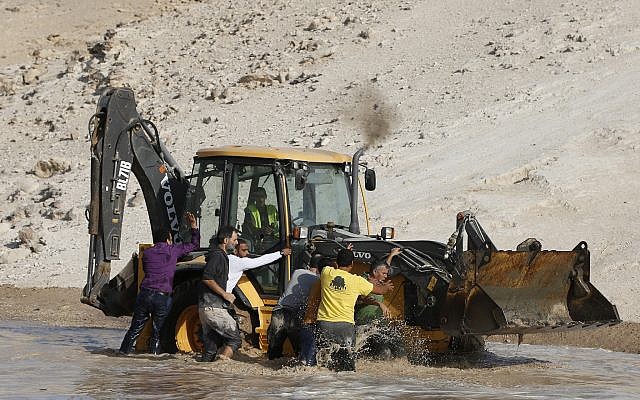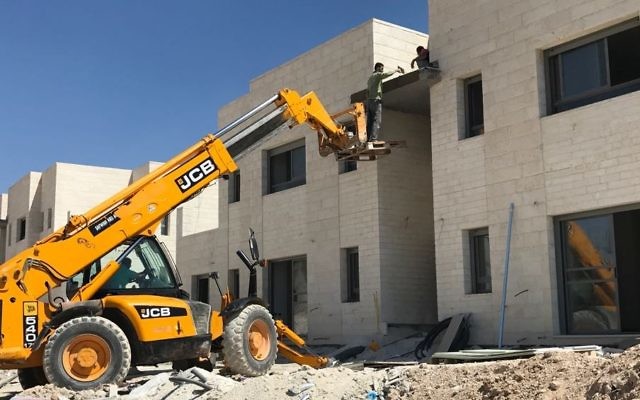The newly agreed terms of the coalition agreement between the Likud and the far-right Religious Zionism parties will give the latter outsize influence over civilian issues in the West Bank and almost certainly allow for accelerated growth of Israeli settlements there.
In addition, enforcement against illegal Palestinian construction in the territory will be ramped up significantly, a step which would likely generate strong international opposition and heighten tensions with the Palestinian Authority and the Palestinian populace more generally.
According to the coalition deal agreed on Thursday between Likud leader Benjamin Netanyahu and Religious Zionism leader Bezalel Smotrich, authority over the Civil Administration — an agency of the Defense Ministry and the IDF which directs civilian life in Area C of the West Bank — will be transferred from the Likud defense minister to a junior minister within the Defense Ministry who will be an appointee of the Religious Zionism party.
The Coordinator for Government Activities in the Territories (COGAT) unit, another Defense Ministry agency that serves as the military liaison to the Palestinians and oversees various civilian issues for Palestinians will also fall under the junior minister.
The Civil Administration has control over planning and construction in Area C of the West Bank for both Israelis and Palestinians, as well as enforcement against unauthorized construction, be it by settler activists or Palestinians.
Get The Times of Israel's Daily Edition by email and never miss our top stories
The Oslo Accords, a series of agreements signed by Israel and the Palestine Liberation Organization, divided the West Bank into three areas: A, B and C. Area A refers to parts of the West Bank under Palestinian security and administrative control; Area B alludes to places in the territory under Israeli security control, with certain exceptions where Palestinians maintain limited security control, and Palestinian administrative control; and Area C is those locations under both Israeli security and administrative control.
Decisions made by the administration have until now required the final approval of the defense minister, but this function will now be transferred to the Religious Zionism junior minister albeit “in coordination and agreement with the prime minister,” the Likud stated.

Likud party leader Benjamin Netanyahu, right, and Religious Zionism party leader Bezalel Smotrich sign a coalition deal in Jerusalem on December 1, 2022. (Likud)
Smotrich had initially sought to have the Civil Administration transferred to the Finance Ministry, which he’ll be running, which sparked pushback from critics who said it would amount to de facto annexation of the West Bank. The deal to keep the body under the Defense Ministry ostensibly represents a compromise between the sides.
The Religious Zionism party and its leader Bezalel Smotrich are strident advocates for expedited and expanded settlement construction throughout Area C of the West Bank, which comprises some 60 percent of the territory.
The party’s election manifesto calls for the retroactive authorization of some 70 unauthorized settlement outposts where approximately 25,000 settlers live, and sets itself a goal of bringing another one million settlers to the West Bank by reducing the bureaucratic process required for new settlement construction.
It also calls for intensified efforts to map out land ownership in the West Bank in order to enable the declaration of more land as state-owned on which to build settlements.
There are currently some 491,000 Israelis living in the West Bank settlements of Area C.
While the international community considers all settlement activity illegal in the West Bank, which Israel captured from Jordan in the 1967 Six Day War, Israel differentiates between legal settlement homes built and permitted by the Defense Ministry on land owned by the state, and illegal outposts built without necessary permits, often on private Palestinian land.
With control over the planning and construction process through the Civil Administration, Religious Zionism will be well-placed to rapidly expand settlement construction and the establishment of new settlements.

Activists try to block a bulldozer working on a sewage pond in the West Bank Bedouin village of Khan al-Ahmar which is slated for demolition by Israeli authorities, Oct. 15, 2018. (AP Photo/Nasser Shiyoukhi)
The Civil Administration is also responsible for evacuating and destroying illegal construction in the West Bank, whether it is by Palestinians or settler activists.
One of Religious Zionism’s declared goals is to bring to a halt all unauthorized Palestinian construction in Area C. Right-wing organizations claim that illegal Palestinian construction in the territory is rampant, which they worry allows the Palestinian Authority to create physical land bridges between the non-contiguous islands of Area A and B territory of the West Bank.
Smotrich and his party argue that this is part of a political program to create a de facto, territorially contiguous Palestinian state which they vociferously oppose.
Even under previous governments the Defense Ministry only rarely issues construction permits for the tens of thousands of Palestinians living in Area C, whereas permits for several thousand housing units are approved for the Israeli settlements every year.
Enforcement against illegal Palestinian construction is therefore likely to be ramped up significantly by the Civil Administration under Religious Zionism’s control to stymie this effort.
At the same time, enforcement against illegal settler construction, such as the numerous efforts every month by settler activists to establish new illegal outposts, is likely to grind to a halt.

A photograph of the construction work being done for a new neighborhood in the Ma’ale Amos settlement on June 18, 2017. (Jacob Magid/Times of Israel)
Smotrich, his party colleagues, and numerous Likud MKs have routinely condemned the Civil Administration’s evacuation and destruction of such outposts, and the junior minister is unlikely to instruct the authority to remove such outposts when it falls under their control.
Settler groups warmly welcomed the coalition agreement.
The head of the Yesha settlement council umbrella group Shlomo Neeman said the nascent government now faced the challenge of “bringing construction back [to the settlements], and developing and preserving state land in Judea and Samaria and the Jordan valley,” using the Biblical terms for the region.
And the head of the Benjamin Regional Council in the West Bank Yisrael Gantz, who was involved in the negotiation of the deal, said the agreement would lead to the “fortification and strengthening” of West Bank settlements.


